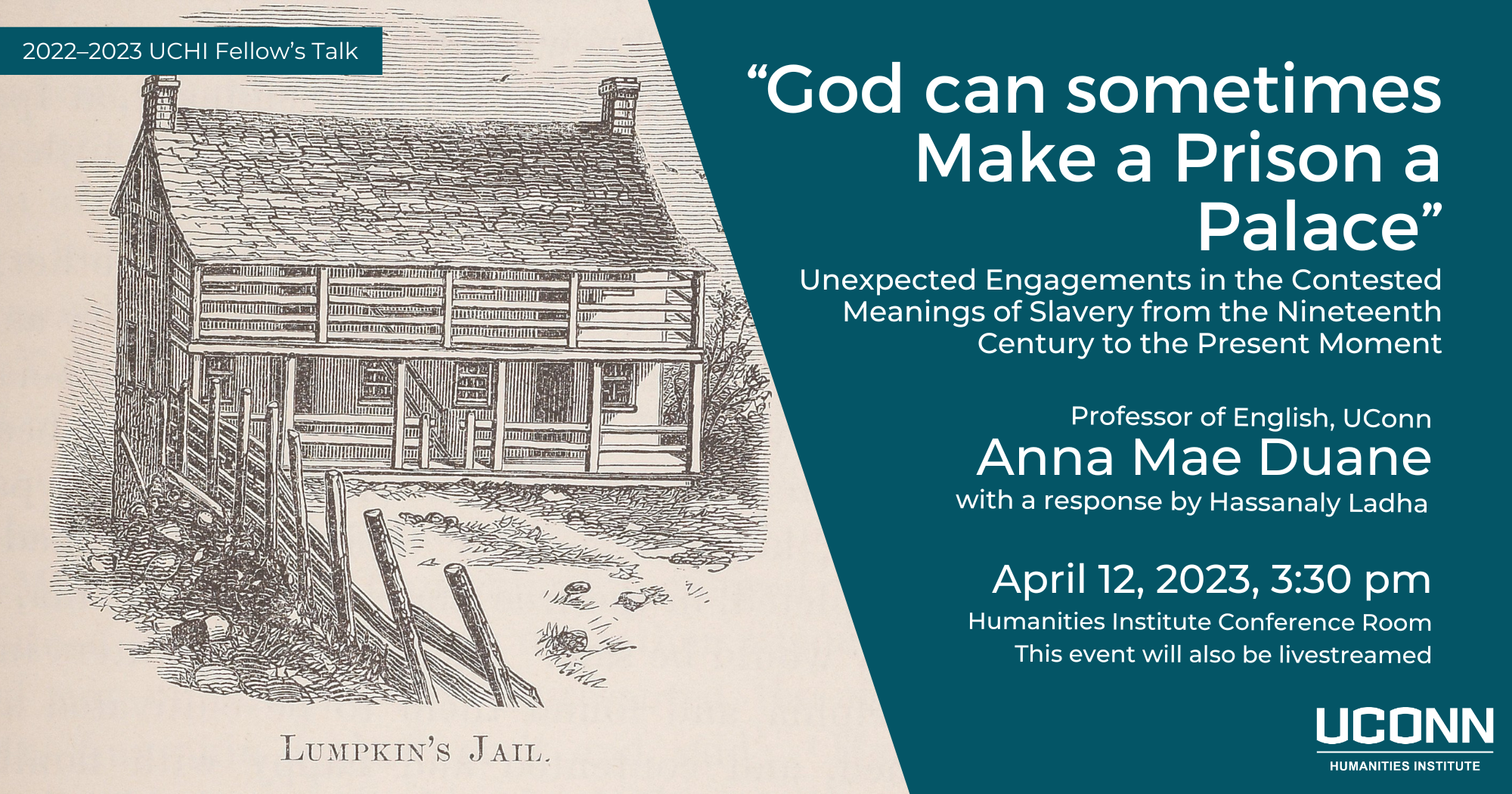“God can sometimes Make a Prison a Palace:” Unexpected Engagements in the Contested Meanings of Slavery from the Nineteenth Century to the Present Moment
Anna Mae Duane (Professor, English, UConn)
with a response by Hassanaly Ladha (LCL, UConn)
Wednesday, April 12, 2023, 3:30pm, Humanities Institute Conference Room (HBL 4-209)
Add to Google calendar Add to Office 365 calendar Add to other calendar
The event will also be livestreamed with automated captioning.
How is that one word—slavery—can be deployed to completely opposite ends? Even as it evokes divisive racial and colonial histories, the term slavery has the capacity to accommodate an incredibly diverse, and often paradoxical, set of political arguments and legal practices. This talk, taken from Duane’s book in progress, Like A Slave: Slavery’s Appropriation from The Revolution to QAnon, explores how slavery has been deployed as a metaphor, and in the process, the ways Americans have continually reshaped the collective memory and historical meaning accorded to the most brutal—and central—institution in the history of the United States. Duane contends that slavery’s shifting meanings have emerged as an ongoing dialogue between white supremacist appropriations of slavery’s threat and Black authors’ insistent rewritings of slavery’s meanings. As white writers imagined everything from seduction, to drunkenness, to imprisonment as a form of “slavery,” they were also implicitly shifting the parameters of what constituted freedom. Thus, when nineteenth-century Black writers insisted on alternate ways of defining and remembering slavery, they are offering rhetorical, legal and imaginative redefinitions of not only the crime of enslavement, but also the possibilities of freedom. This talk will focus on how literary depictions of prison—the very status that animates slavery analogies for prison abolitionists today—were sometimes imagined by nineteenth-century African American authors as sites of respite and resistance from the alleged freedom offered by the white household.
Anna Mae Duane is a Professor of English and American Studies at the University of Connecticut. She has written or edited six books, including Suffering Childhood in Early America: Violence Race and the Making of the Child Victim; The Children’s Table: Childhood Studies and the Humanities; Child Slavery before and after Emancipation: An Argument for Child Centered Slavery Studies. She co-edited Who Writes for Black Children: African American Children’s Literature before 1800 with Kate Capshaw. She is the co-host, along with Victoria Ford Smith and Kate Capshaw, of the Children’s Table Podcast. Her work has been supported by the NEH, the Fulbright Foundation, and by the Yale Gilder Lehrman Center for the Study of Slavery, Resistance and Abolition. Her latest book, Educated for Freedom: The Incredible Story of How Two Fugitive Schoolboys Grew Up to Change a Nation, was supported by a UCHI Faculty Fellowship. During her fellowship year, Professor Duane will be working on a book project entitled, “Like a Slave: Slavery’s Appropriation from the American Revolution to QAnon.”
Hassanaly Ladha is an Associate Professor of French and Comparative Literature and the Graduate Advisor in French and Francophone Studies at the University of Connecticut. He holds a bachelor’s degree in English from Yale University and a Ph.D. in Comparative Literature from Princeton University. He taught at Harvard University before joining the faculty in Literatures, Cultures, and Languages at UConn. His first book, The Architecture of Freedom: Hegel, Subjectivity, and the Postcolonial State (Bloomsbury Academic, 2020), which was supported by a 2015–2016 Humanities Institute Fellowship, offers a new reading of Hegel’s related theories of Africa and the dialectic, language and the aesthetic, and mastery and slavery, tracing the implications of these concepts for postcolonial studies and political theory.
Access note
If you require accommodation to attend this event, please contact us at uchi@uconn.edu or by phone (860) 486-9057. We can request ASL interpretation, computer-assisted real time transcription, and other accommodations offered by the Center for Students with Disabilities.


